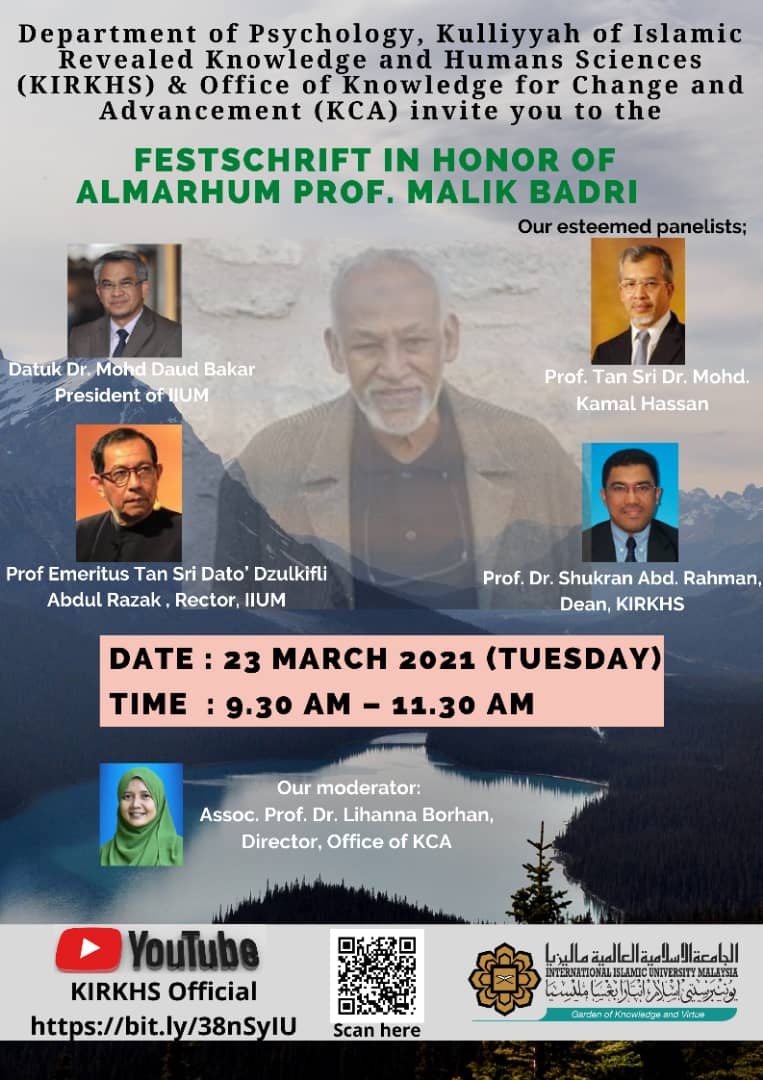OFFICE OF KNOWLEDGE FOR CHANGE AND ADVANCEMENT
Murabbi Series
Contact Info
Office of Knowledge for Change and Advancement (KCA),
International Islamic University Malaysia,
P.O. Box 10, 50728 Kuala Lumpur
MALAYSIA
Phone: +603-6421 6781/6783/6787
Fax : +603-6421 6789
Email : kca@iium.edu.my


If you Have a Complaint or Suggestion About Our Services, We Want to Hear from You

Help Us to Improve Our Services
Murabbi Series
Session 1: Professor Emeritus Tan Sri Dr. Mohd. Kamal Hassan
Date: 24th January 2019

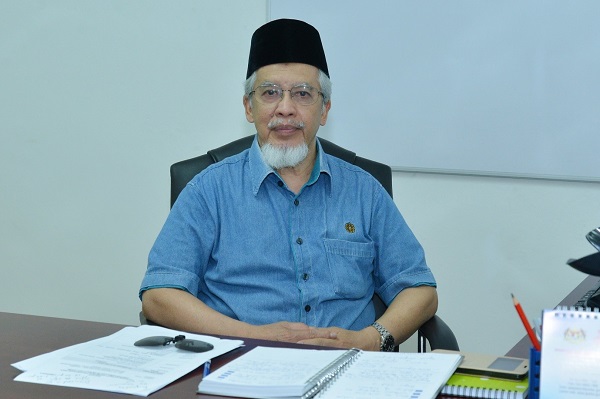
A Conversation with Our Murabbi Professor Emeritus Tan Sri Dr. Mohd Kamal Hassan
On the 24th January 2019 representatives from the Office of Knowledge for Change and Advancement (KCA), the Office of Communication, Advocacy and Promotion (OCAP) accompanied by Dr. Nadzrah Ahmad from Kulliyyah of Islamic Revealed Knowledge and Human Sciences (KIRKHS) made a short trip to Institute Latihan Islam Malaysia (ILIM) in Bangi, Selangor to meet one of the most popular and influential figures in IIUM, Professor Emeritus Tan Sri Dr. Mohd Kamal Hassan.
Upon our arrival, we were ushered to a meeting room to wait for his arrival. We were a bit apprehensive about the kind of reception that we would be getting. With butterflies in our stomachs, we quietly ask questions to ourselves; how should we greet him? What should we say first? And how would he react to our questions? All our concerns disappear as soon as we heard Professor Kamal’s a gentle voice giving salam as he entered the room.
After exchanging pleasantries and a short ta’aruf we began our discussion, which revolved around his years in IIUM, how he spends his time now, and finally the history as well as the relevance of the IIUM song. Professor Kamal spoke fondly of his days in IIUM, his plans and achievement and the people who worked for and with him. He also spoke highly of IIUM ideals, vision and mission. We believe that, to his mind these features of IIUM reflect the identity of IIUM just as the wearing of songkok and tudung during IIUM convocation. In terms of his present activity, we were quietly surprised when he mentioned that he has just started his attachment to ILIM which is on voluntary basis. While many figures at his age feel contented resting at home, true to the spirit of sharing and seeking knowledge, Professor Kamal still finds time to share his knowledge and wisdom with others at no costs.
Professor Kamal’s tone of voice changed to a more one serious one as we started talking about the conception, composition and more importantly the selection as well as the meaning of words and phrases in the lyrics of IIUM song. We felt that he took the task of coming up with IIUM song very seriously. The song, to him, should not be sung merely as part of a ceremony. Although he agreed that the IIUM song should be identified as “IIUM anthem”, he believes that the meaning of the song should be understood and internalized by all because the song is loaded with messages. At the very least, it can unite IIUM community, wherever and whoever they are now.
Our discussion with Professor Kamal progressed amicably and interspersed with reminder and laughter. His comments, advices and suggestions were well-elaborated and he even invited us to exchange ideas with him, quite like a father talking to his children. Throughout our discussion with Professor Kamal, we sense that his love and concern for IIUM has never changed or diminished. We feel that all he wants is for IIUM to live up to its expectations and to succeed in providing education for the ummah. As for the immediate future of IIUM, he agrees with the initiatives of the present Rector’s office and with the right support from IIUM community, Professor Emeritus Tan Sri Dato' Dzulkifli Abdul Razak might just be the right person to lead IIUM into the future.
The discussion ended with Dr. Zulkefli Muhammed Yusof from KCA handing over a basket of fruits to Professor Kamal as a token of appreciation. A small gift for someone who has given so much to IIUM.
Leading the Way: The Philosophy of IIUM Song
Prof. Emeritus Dr. Kamal Hassan and Dr. Nadzrah Ahmad
International Islamic University Malaysia
Introduction
The IIUM Song entitled Leading the Way was composed by the late Johan Nawawi back in 2007. One of its primary objectives is to strengthen the emotional bond among IIUM community. It is rather emotional instead of intellectual because the melody appeals to the heart, not to the intellect. The song highlights the ideals of IIUM which includes its vision, mission and principles. It also aims to foster the ukhuwwah Islāmiyyah among Muslim brothers and sisters. From an aesthetic viewpoint, the song has its own uniqueness. It starts with the melody of chirping birds, which put the listener into the state of calmness. Its overall melody is also a mix between contemporary and traditional Malay melody. The main themes of the song are described below:
Leading the way
The song starts off with the implied objective of a khalīfah, to lead humankind to the right path of God. Today, the zeitgeist of humanism of our modern world has however, granted everybody the right to lead humankind to his or her path. As far as Islam is concerned, from the perspective of a Muslim, the right path is one, which is al-ṣirāṭ al-mustaqīm. The right path aims to steer those who willingly tread it back to God, not leading humankind away from God.
Enlightening the future
The philosophy of nihilism and absurdism today has painted the world pessimistically dark and bleak. A large deal of its philosophy owes its emergence to the strand of post- modernism. Post-modernism has decreed the principle of deification of reason and the rejection of revelation as its essential drive. It also brought the crises of existence, which as has been professed by Protagoras, due to the role of homo mensura i.e. that man is the measure of all things. It is only by following the right path that we can enlighten the future and develop optimism.
Sharing the wisdom
The Qur’ān has called upon humankind to follow the right path by submitting themselves to the Divine will. It is by following the revelation that we may attain wisdom, for revelation is also ḥikmah from Allah SWT. The Qur’ān also urges Muslims to spread the spirit of Islam with “ḥikmah and good advice.”
Internalising the spirit of Islam
The quintessential spirit of Islam is tawḥīd that is the divine uncompromising oneness of God. The element of tawḥīd is the fundamental basis for an Islamic worldview, and that it must be let permeated through the whole system.
Relying on Revelation and reason
The primary essence of IIUM is the integration of revelation and reason. In the epistemology of Islam, knowledge is not received only by reason, but also by the virtue of revelation. Revelation and reason are not two separate phenomena, but rather integrated.
Readiness to excel and prevail (We shall excel we shall prevail)
The line gives the promise of an ultimate success. It also implies the struggle against ungodly forces such as kufr, hypocrisy, nafs, materialism, egoism et cetera. It is a call to excel and prevail over these obstacles. On the other hand, excel also means comprehensive excellence, which is one of the mission of IIUM
Merging faith and knowledge
Some of those who have knowledge today believe humankind should depart from God. They believe things can be solved with sole reason and science. Islam however, views reason and science not as an infallible epistemology. Therefore, it has decreed that knowledge which is sought by the learners, must be grounded on faith. It is fundamental because the revelation also comes from God, and therefore its validity is safeguarded.
Carrying the roles of Khalifah (We are the khalīfah)
All the tasks and objectives are incumbent upon us because we are the khalīfah. All human beings regardless of their beliefs and religions are appointed as khalīfah. One of the important task for us to do is the ‘imārat al-kawn, to administer, manage, develop, and flourish.
Fulfilling the Amanah (We will fulfil the amānah)
The world is an amānah that Allah has given us to be fulfilled. We are obliged to fulfil the role of bringing peace and harmony to the world.
Making this world a better place (Together, let’s make the world a better place)
The line serves as a rallying cry for all humankind to make the world a better place. It includes everybody, not only the Muslims but the non-Muslim as well, to work together and making the world a more inhabitable place. The world has to be worked out to make it a better place because today, human beings are suffering, devoid from spirituality and overpowered by materialism.
Upholding the culture of learning (Forever expand the culture of Iqra’)
The concept of Iqra’ is so foundational in Islam. It can be seen from the fact that the first revelation being revealed to the Messenger SAW is to read, based on surah al-‘Alaq. But the first revelation does not stop at read or recite; it follows to read and recite on the name of God. Allah is the one who knows, human beings are the one without knowledge. The pen as the instrument of pursuing knowledge is also sanctify by God. That implies that the pursuit of knowledge is sacred. Knowledge is also an amānah. The learners who fulfil the amānah of knowledge becomes scholars. In Islam, scholars occupied a great position. After the prophets, it is the scholars in the hierarchy. Scholars should be the inheritors of the prophets. But unfortunately, today scholars are divided from prophethood. To some of them, God is superfluous, and they therefore departed from the path of God. This is exactly the phenomenon revealed in the Qur’ān when Allah says: he views himself as self-sufficient (an ra’āhu astaghnā). So, to expand the culture of Iqra’ is vital to become, not only the culture of Muslims, but also the culture of humanity.
Realising the meaning of rahmatan lil ‘alamin (IIUM is to realise the meaning of rahmatan lil ‘alamin)
IIUM is one of the educational instruments to realise the mercy to all mankind. Here, one of the manifestations of raḥmah is the integration of revelation and reason. Besides that, the concept of Iqra’, submission, sharī‘ah, aqīdah and akhlāq are all mercy from God to humankind as well. Mercy should not be reduced to tolerance per se. Its source is from the Messenger SAW himself, who is the embodiment of raḥmatan lil ‘ālamīn; his sayings, deeds and actions all are mercy as well.
Session 2: Professor Dato’ Dr. Md Tahir bin Md Azhar
Date : 27th February 2019
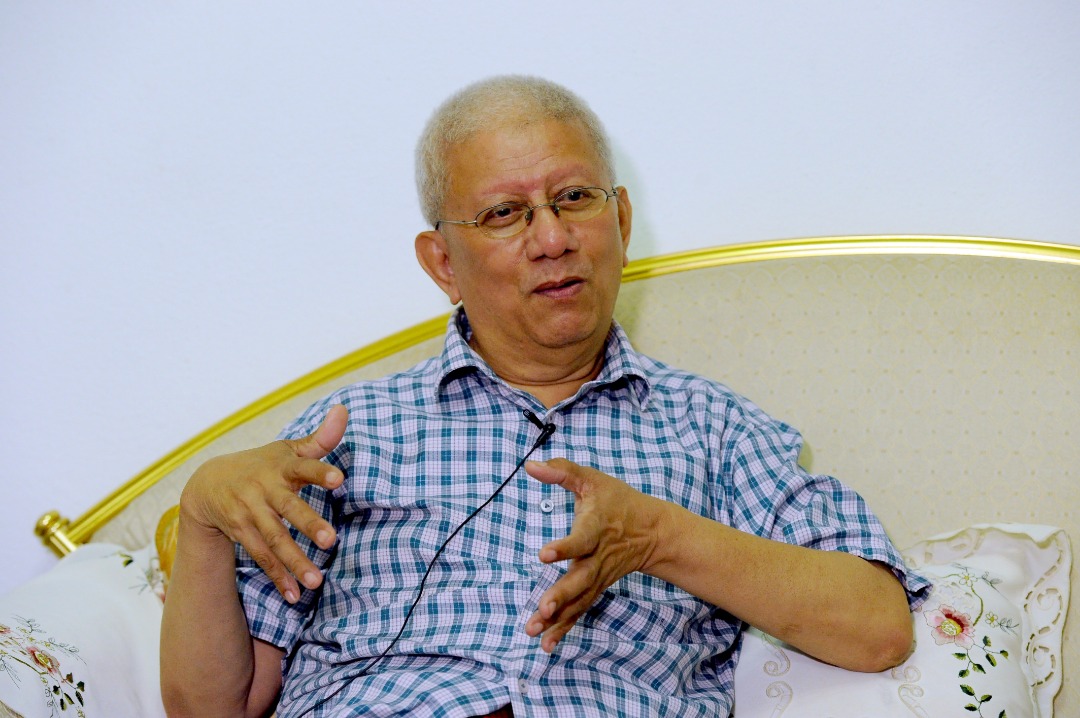
Our second trip in the Murabbi Series took us to Kampung Sungai Plong. After driving for about half-an-hour we found ourselves at the driveway of a bungalow located in a serene environment apart from the sound of goats bleating. But as soon as the door opened, you know that the bungalow belongs to Professor Dato’ Dr. Md Tahir Md Azhar (here onwards addressed affectionately as Dato’ Tahir). The friendliness and candour that he exhibited when greeting us reminded us all of the days when he was in IIUM.
We know that this time it’s going to be an awkward interview. How else would one describe this interview? Here is a man who can crack jokes that tickle your ribs to no end and at the same time mesmerize you with brilliant ideas, comments and yes, friendly sarcasm – all in one breath. Quite unique for a seasoned oncologist who is about to celebrate his 70th birthday in a few months’ time. One would have thought that at this ripe age he would have mellowed down a bit, but nooo… this is Professor Dato’ Dr. Md Tahir Md Azhar, in case you forget.
Being someone who is instrumental in the development of Kuantan Campus in general and the Kulliyyah of Medicine specifically, we feel that Dato’ Tahir is the right person to talk about the skills of people management. Far from what is professed in human resource textbooks, we are more interested in listening to his hands-on methods of managing people. After all, he has been doing it for many years and it seems to be working fine.
Dato’ Tahir does not believe in a one-man-show approach of completing a task. In fact, he believes in delegating responsibility to trusted and able people and in monitoring progress through strategic visits and meaningful mutual feedback.
Looking back on his days in IIUM, Dato’ Tahir tries to focus more on the tasks at hand and not the people. While honesty and sincerity are the two people’s qualities high on his list, he also suggests that in a big organisation, like IIUM, members of staff should not be competing but co-operate with each other. The way to success for him is by achieving the common institutional goals rather than the obtainment of personal victory and the completion of tasks and the benefit of the tasks far outweighs other reasons.
Dato’ Tahir is quite practical in that he accepts that disagreement happens all the time. What is more important to him is the manner by which the disagreement is resolved. He believes that, for a good leader, the art of communication begins with the upholding of principles in doing something, not by banking on sentiments or by offering justifications whenever an initiative goes south. Besides possessing vested power, knowledge and skills, Dato’ Tahir believes that above all, a leader should be inspirational to others and to this end Dato’ Tahir specifically mentions Professor Tan Sri Mohd Kamal Hasan as an example of a leader who has this inspirational quality. Quite a complement from one successful academician and leader to another.
Dato’ Tahir never forgets the people who have worked for and with him. He suggested that although certificates, awards, promotion and gifts are good to show appreciation to the subordinates in ceremonies, kind words and handwritten letters thanking the members of staff for their service can serve the purpose better because they come from the heart and personal in nature.
On matters related to the academics, Dato’ Tahir considers good recruitment of new academic staff as being very important and he proposes a more rigorous selection procedures. He warns against selecting candidates who are not suitable for IIUM. Dato’ Tahir views good academics as those who are honest, contribute whole-heartedly to the University and who are willing to fight for the cause of IIUM.
On the measure of the present IIUM students’ quality, Dato’ Tahir sounds deeply apologetic when he says that despite the fact that the majority of IIUM students turn out well, some are still well below his expectation. He believes that all IIUM students should, at all times, exhibit good qualities such as knowledgeable, Islamic in their thinking and behaviour and they should be able to carry themselves well in this world.
A very resolute man, Dato’ Md Tahir never minces his words when giving his views or putting forward an argument. He is what one calls a straight shooter. Whether it is his personality, upbringing or his professional training, Dato’ Tahir believes in telling things like they are. He proudly says, “I like to call a spade a spade”. He prefers to tackle an issue head-on rather than sweeping it under the carpet.
Towards the end of the interview, Dato’ Tahir indicated that he truly believes that IIUM has the necessary facilities to provide quality education to the students and conducive environment to prepare new generations of Muslims. But in order to achieve more and faster, Dato’ Tahir also believes that IIUM needs more Kamal Hasan and more people like Kamal Hasan, something that we all hope can happen sooner than later.
At present, Professor Dato’ Md Tahir Md Azhar is working for Taylor’s University. He spends his free time reading, sewing and yes, looking after his goats, a passion that he develops ever since he was a small boy.
Session 3: Prof. Emeritus Dr. Ismawi Haji Zen
Date: 27th August 2019
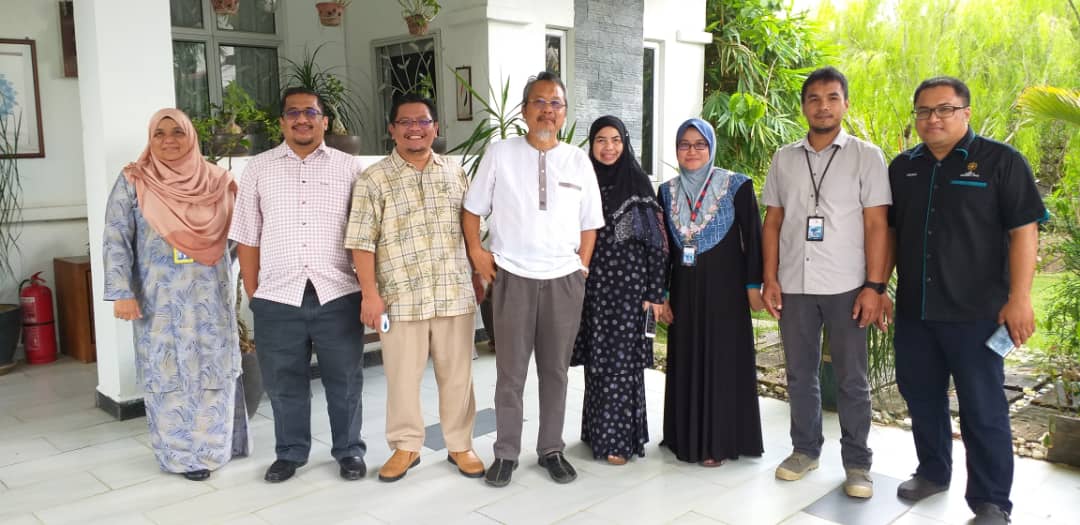

Professor Emeritus Dr Ismawi Haji Zen, as resolute a man he is, could never imagine that he could be where he is now. During his early childhood Ismawi was used to doing odd jobs to supplement the family earning. You name it and probably he had done it; working at the paddy field, weeding out grass or working in a sawmill. In school, when the other students were playing football or were going to towns on weekends, Ismawi would wash their clothes or do their homework, just to eke out some pocket money, a point that Ismawi made with his eyes welled up. This is a far cry from the type of a childhood background one would expect a successful person would have.
But that was a long time ago. From a very humble beginning in Kampung Gedong, Samarahan, Sarawak, Professor Emeritus Dr. Ismawi Haji Zen has risen to become a respected academic and architect. He even made his name at the national and international levels. Ismawi obtained his bachelor’s degree from the Universiti Teknologi Malaysia and, master’s as well as his doctor of philosophy degrees from the University of Edinburgh. He is also a member of Malaysian Institute of Planners and the Institute of Landscape Architects Malaysia.
Professor Emeritus Dr Ismawi Haji Zen was honoured as the Tokoh Maal Hijrah Negeri Sarawak in 2010 and he is also the recipient of Anugerah Perdana Maulidur Rasul 2011. At the international level, one of his achievements that stands out among others is his appointment by the Kingdom of Saudi Arabia to lead a panel of international architects for the development and renovation of Makkah including the Masjidil Haram. In terms of service, Ismawi has worked in many capacities. From an assistant lecturer to a professor, visiting lecturer, dean and Deputy Rector for the IIUM. He also sits in many boards of advisory.
Professor Emeritus Dr Ismawi Haji Zen makes it clear at the beginning of the interview that his family is the most important thing in his life. The mother, for her love and the siblings, for their company. But above all, Ismawi obviously looks up and admires his father, a poor but a renaissance man of sort to him. His father was the man who told him that only education could change one’s life. An avid reader, Ismawi’s father would tell him about places and big cities that he had seen on his way to Mekah during his pilgrimage. Ismawi believes that his father, this kampung man, had implanted a vision on him for his future. Ismawi also talks highly of his brother who made the decision to quit school just so that Ismawi can stay in one. Family sacrifices in nothing short of common to Ismawi and hardships in life has taught him about the value of family, life and education.
In terms of his specialization, Professor Emeritus Dr Ismawi Haji Zen believes that, in Islam, architecture is more than just arts. Designs of structure and buildings when imbued with Islamic elements would give “syiar” to Islam. And he also claims that there is a quotation somewhere which says that architecture is the best servant of Islam. Ismawi believes that KAED in IIUM views Islamic architecture differently from other architecture programmes. While other institutions or even non-muslim architects view Islamic architecture as parts and parcels of the architecture discipline, in IIUM the Islamic elements of architecture become the basis of architecture.
In managing the development of IIUM, the people and expertise, Ismawi believes that IIUM should come back to the main reasons of its presence and that is to lead the others. And, to him, the best way to do it is to instil Islam and its values in the hearts of IIUM population. The awards and accolades can and will come later. In short, the recognition should not be the ultimate objectives of what we do. “We should worry about the inside first. Islam is not like “pakai baju”, he retorted. Spiritual activities like qiyam al-lail is still important to him. Ismawi did not mince his words when he said that IIUM is fast becoming like other institutions where people are rewarded for writing a lot of papers but these people are not necessarily good lecturers.
In terms of the roles played by the lecturers, Professor Emeritus Dr Ismawi Haji Zen emphasizes the importance for the lecturers to be murabbis and examplars to the students. Lecturers should motivate students to excel and move them to contribute to the ummah. The emphasis of teaching should begin with the introduction of new knowledge and the application of the knowledge. This is followed by the discovery of more knowledge and ultimately the construction of new knowledge. Ismawi suggests that excellence is a dynamic thing, once you have achieve it, it will become obsolete and you have to find another excellence and, through innovation, we should make the knowledge and excellence available to the general ummah.
Professor Emeritus Dr Ismawi Haji Zen believes that reputation is important but we need different and better ways to measure achievement rather than by looking at the level of ranking, the number of papers and the medals in competition. The best way to him is to look at the impact and the contribution one and we make to the society. He offers the view, which he says shared by Tan Sri Professor Kamal Hasan, that internationalization does not necessarily mean the numbers of students from different countries in IIUM. We should view internalization in terms of the ways we think and the ways our students think. Students should be encouraged not only to excel in their fields of specialization but also in their spirit of making changes in their societies, wherever that might be.
Professor Emeritus Dr Ismawi Haji Zen values the importance of the non-academic staff but he believes that before we reward our non-academic staff we should treat them as enabling staff rather than as administrative staff. The fact that they contribute to our work makes them part of our team. In fact, IIUM, academic and the non-academics should work together to mould all IIUM students. And that, to him, makes us all members of the same team. In his free time Professor Emeritus Dr Ismawi Haji Zen keeps himself busy by collecting antique memorabilia and planting hard-to-find herbs and plants around his house. Nowadays, cities and beautiful places overseas always reminds him of his father and his vision. An everlasting memory of a father. Probably that is why Ismawi finds himself rooted to the ground after all these years.
MURABBI TALK SERIES 1 : The Malay Concept of Sejahtera from an Islamic Perspective
Slide presentation: The Malay Concept of Sejahtera from an Islamic Prespective: an Introduction
MURABBI TALK SERIES 2: Calibrating the IIUM Mission to Move Forward
MURABBI TALK SERIES 3: Transformative Education Through Community Engagement
Slide presentation: Transformative Education Through Community Engagement
MURABBI TALK SERIES 4: The Tapestry of Malaysian Culture and Values: The Role of Academics in Promoting Malaysia to the World
MURABBI TALK SERIES 5: The Humanising of Education Through Responsible Research and Innovation
MURABBI TALK SERIES 6: Integrated and Collaborative Research for Humanity: Impact, Challenges & Possibilities
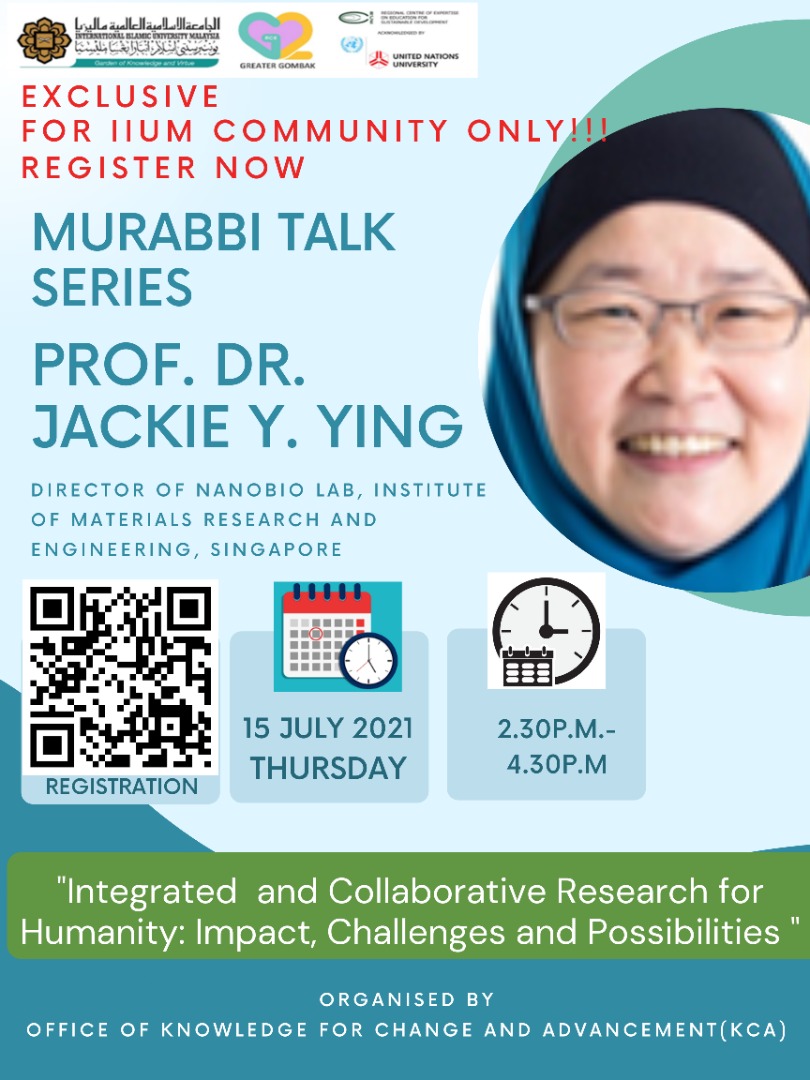
MURABBI TALK SERIES 7: How to be an Effective Murabbi
MURABBI TALK SERIES 8: Reviving Intellectual & Moral Integrity in the Academia: An Islamic Challenge
MURABBI TALK SERIES: IIUM LEADING THE WORLD : A ROUND TABLE DISCUSSION ON CHALLENGES, OPPORTUNITIES AND PLAN OF ACTIONS-SERIES 1
MURABBI TALK SERIES: INTERNATIONALISATION: What I Thought It Meant for IIUM
MURABBI TALK SERIES: Scholarship and Financial Sustainability at IIUM: Issues and Recommendations
MURABBI TALK SERIES: My Research Activities and How I managed Research at UKM and IIUM
Endurance Cycling as a Reflection of Life by Prof. Dr. Jamalludin Ab Rahman
Healing the Emptiness Through Community Engangement by Dr. Azrul Azlen Abd. Hamid
Supporting Learning & Earning in Unusual Times: A Window into Digital Entrepreneurship by Assoc. Prof. Dr. Nurazzura Mohamad Diah, KIRKHS
Gender Dysphoria, SAF is the Solution for Cure by Prof. Dr. Samsul Draman, KOM
Tackling the Collision of Tobacco Epidemic with Covid-19 Pandemic by Assoc. Prof. Dr. Mohamad Haniki Nik Mohamed , Kulliyyah of Pharmacy
Leadership and Teamwork in Dakwah- An Experience of Dakwah in Japan Dakwah Centre, Osaka by Ustaz Abdullah Bukhari Abdul Rahim, CELPAD Lecturer


Festchrift in Honour of Almarhum Prof. Malik Badri
Date: 23 March 2021/Tuesday
Time: 9.30a.m-11.30a.m
Platform: IRKHS YouTube Live ttps://bit.ly/38nSyIU
